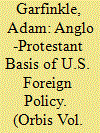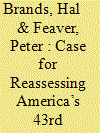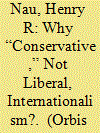|
|
|
Sort Order |
|
|
|
Items / Page
|
|
|
|
|
|
|
| Srl | Item |
| 1 |
ID:
161762


|
|
|
|
|
| Summary/Abstract |
U.S. foreign policy thinking is based ultimately on the particular historical experience and cultural legacy of the American founding, and at the very base of that founding is the preeminence of Anglo-Protestantism. The religious heritage of the United States, a sixteenth century blend of a theological reformation and the rise of modernity in the Enlightenment, has endowed American politics with a predisposition for egalitarian, anti-hierarchical, and contractual forms, and that disposition applies as well to foreign affairs. The syntax, but not the content, of Anglo-Protestantism shapes basic attitudes particularly when political elites face crisis situations, but it is institutionalized in government and society at all levels. Six examples from the post-World War II period illustrate the case.
|
|
|
|
|
|
|
|
|
|
|
|
|
|
|
|
| 2 |
ID:
161759


|
|
|
|
|
| Summary/Abstract |
Contemporary judgments of George W. Bush’s foreign policy were often quite harsh and polemical. In this article, we argue that a moderate form of Bush revisionism is likely to emerge in the coming years, as scholars take a more dispassionate look at his achievements in global affairs and the difficult circumstances under which his administration labored. We offer the six most persuasive arguments in favor of Bush revisionism; we then discuss the most reasonable critiques of these arguments. The overall thrust of this essay is not that Bush will someday be seen as one of America’s most successful statesmen, but simply that his reputation should improve as partisan passions fade and new evidence is considered.
|
|
|
|
|
|
|
|
|
|
|
|
|
|
|
|
| 3 |
ID:
161754


|
|
|
|
|
| Summary/Abstract |
This introductory essay seeks to historicize the term “conservative internationalism.” It examines how interpretations evolved over the past century and identifies key figures who espoused distinctively conservative visions of America’s role in the world. The majority share a number of common traits: a fervent commitment to guarding national sovereignty against excessive supranational infringement, dedication to maintaining a strong military, trust in the efficacy of American power, a realist appreciation of the need to go to war and concern for order and stability at home and abroad. Yet there are also important differences over the purpose of American power.
|
|
|
|
|
|
|
|
|
|
|
|
|
|
|
|
| 4 |
ID:
161760


|
|
|
|
|
| Summary/Abstract |
This article outlines the principles of a new conservative internationalism for the Trump era, and discusses how well the administration’s actions and words fit this paradigm. In order for Republicans and conservatives to reclaim their reputation as the party of strong national defense and competent foreign policy, current and future policymakers need to blend some traditional principles of conservative internationalist foreign policy with new adaptations required by challenging international security developments on the one hand, and changes in the domestic political views of right-leaning American voters on the other. A year into the Trump administration, there are some signs that the administration is indeed attempting to adjust slightly rather than replace the traditional principles of conservative Republican foreign policy, and therefore the “America First” grand strategy framework might become much more traditional in its actual policy decisions than in some of its rhetoric.
|
|
|
|
|
|
|
|
|
|
|
|
|
|
|
|
| 5 |
ID:
161761


|
|
|
|
|
| Summary/Abstract |
Conservative internationalism is an important focus for study because it is a good description of America’s de facto grand strategy over time. The United States’ deployment patterns, budgetary priorities, and diplomatic initiatives tend, over the long run and across administrations, to be conservative internationalist in effect and in practice. Sometimes this de facto conservative internationalist median is directly observable in the oscillation from one presidential administration to the next. It is also evident in how policymakers find themselves entrapped between budgetary and military realities on the one hand, and liberal rhetoric and public expectations on the other. American statesmen face competing pressures to make soaring commitments to liberal ideals yet govern with a hard-nosed pragmatism that prioritizes American interests. The resulting blend is, often, a rough approximation of conservative internationalism. That is why it is likely to endure as America’s preferred approach to the world long past the Trump administration. The mix of American idealism and American strength is too potent for policymakers to ignore.
|
|
|
|
|
|
|
|
|
|
|
|
|
|
|
|
| 6 |
ID:
161758


|
|
|
|
|
| Summary/Abstract |
This article explores George H.W. Bush’s foreign policy in order to examine what it can tell us about the successes and weaknesses of conservative internationalism as a world view and as an analytic construct for scholars of international relations. First, to what extent, if any, did the Bush administration’s foreign policy reflect the course and logic of conservative internationalism? Second, what can the Bush administration’s foreign policy tell us about the utility of conservative internationalism as a foreign policy approach relative to alternative approaches?
|
|
|
|
|
|
|
|
|
|
|
|
|
|
|
|
| 7 |
ID:
161756


|
|
|
|
|
| Summary/Abstract |
In considering Grover Cleveland’s life and thought, the author contends that this Democratic president was profoundly conservative. In fact, he meets the criteria for “conservative internationalism,” as defined by Henry Nau. Cleveland was an advocate of solid currency, the government not spending more than it takes in, big business not “railroading” the little guy. And, he fought impediments to free trade, domestically and internationally. Finally, while cautious about American commitments abroad, Grover Cleveland defended an assertive U.S. policy throughout the Western Hemisphere.
|
|
|
|
|
|
|
|
|
|
|
|
|
|
|
|
| 8 |
ID:
161757


|
|
|
|
|
| Summary/Abstract |
This article assesses the foreign policy of Ronald Reagan’s presidency through the lens of conservative internationalism. It finds that the Reagan administration largely embodied the principles of conservative internationalism, particularly through its integration of force with statecraft, the priority it gave to cooperative relations with allies, and its support for the global expansion of political and economic liberty.
|
|
|
|
|
|
|
|
|
|
|
|
|
|
|
|
| 9 |
ID:
161763


|
|
|
|
|
| Summary/Abstract |
This article contends that “best military advice” is a problematic construct for both the military and civilians alike. Yet, the increasing resonance of this construct across the Joint Force cannot—and should not—be summarily dismissed. Instead, it merits reflection about why the term has grown in popularity, how its continued use is influencing the development of defense strategy, and perhaps above all, how it will affect American civil-military relations. As best military advice infuses the U.S. military, it will increasingly become normalized and held up as desirable, particularly among the younger generation. Short of serious near-term steps to neutralize this construct, its deleterious influence will only increase.
|
|
|
|
|
|
|
|
|
|
|
|
|
|
|
|
| 10 |
ID:
161755


|
|
|
|
|
| Summary/Abstract |
There is no broad literature defining conservative internationalism as there is for liberal internationalism and realism. Yet conservative internationalism differs from liberal internationalism and realism in four important ways. First, it seeks a world of limited government or separate sovereign nations not big international institutions. Second, it believes that national security is a function of ideological differences not just relative power or diplomatic misunderstandings. The democratic peace is a much safer world for America than the balance of power or United Nations. Third, it recognizes the need to use force during negotiations, not just after negotiations fail, because authoritarian states will not take negotiations seriously if they can achieve their objectives outside negotiations. And fourth, it advances democracy conservatively by prioritizing regions where strong democracies exist nearby (today Ukraine and Korea) and by using military leverage to reach timely compromises that weaken authoritarian states.
|
|
|
|
|
|
|
|
|
|
|
|
|
|
|
|
|
|
|
|
|